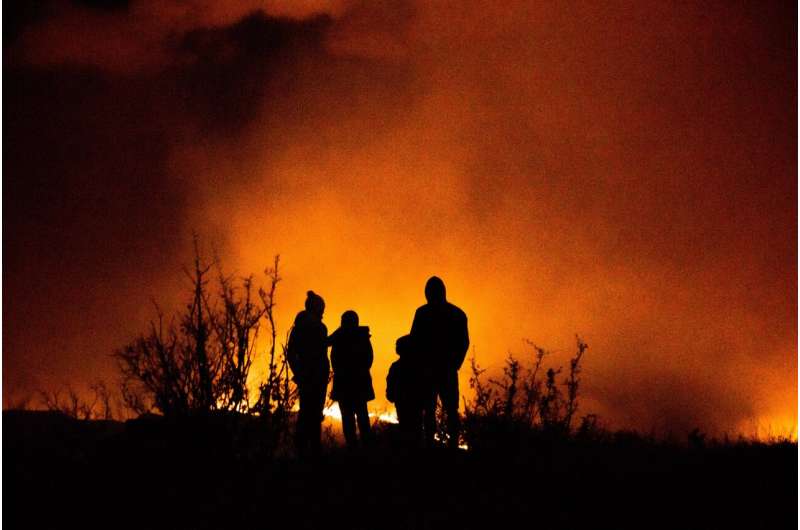This article has been reviewed according to Science X's editorial process and policies. Editors have highlighted the following attributes while ensuring the content's credibility:
fact-checked
peer-reviewed publication
trusted source
proofread
Wildfires linked to surge in mental health-related emergency department visits, study shows

An Emory University study published Thursday in Nature Mental Health shows wildfires lead to an increase of anxiety-related emergency department visits in the western United States, amplifying the concerning parallel trajectory of two escalating public health crises—mental health and climate change.
The study, conducted by researchers at Emory's Rollins School of Public Health, is among the largest and most comprehensive research ever undertaken on the association between wildfire-related exposures and anxiety disorders.
Analyzing satellite-driven data and nearly 1.9 million emergency department visits across five states (California, Arizona, Nevada, Oregon, and Utah) from 2007 to 2018, the researchers showed wildfire smoke events—which is when wildfires become the main source of ambient pollution within a zip code—were associated with a 6.3% increase in mental health-related emergency department visits.
In addition to this startling data, the study shows:
- Women, girls, and older adults are more susceptible to severe anxiety disorders associated with wildfire exposures.
- Men and boys also experienced an increase in anxiety disorders but only when linked to major smoke events.
- Evidence for enhanced disaster risk reduction and climate risk management strategies, including climate awareness and risk communication tailored for vulnerable populations.
What the researchers say
"The scary thing about climate change is it doesn't have a clear boundary; you fear a lot about the unknown. Now we can use the knowledge we've gained to tell people there is no need to panic. When you receive a wildfire smoke alert, close your windows, limit your outdoor activities, and don't panic. Those sorts of preventative measures can potentially benefit the entire population," says study co-author Yang Liu, Ph.D., chair and Gangarosa Distinguished Professor in the Gangarosa Department of Environmental Health at Rollins.
"Mental health is one of the most prevalent health conditions in the U.S. and our study found multiple pathways between wildfires and an association with severe anxiety disorders. Many people are already dealing with some mild or moderate mental health symptoms. Now imagine they wake up and see the sky covered in smoke, they're likely going to feel even more anxious," says the study's lead author Qingyang Zhu, Ph.D., a postdoctoral fellow in the Gangarosa Department of Environmental Health.
Why it matters:
- Rising temperatures and shifting drying patterns substantially escalated the potential for wildfires globally over the past 20 years, resulting in expanded burned areas and prolonged fire seasons.
- The western United States is notoriously a major fire-prone region, due to the recurrent presence of fire weather conditions, increasing droughts, and the abundance of fuel resources.
- Climate change has been linked to a variety of psychological disorders such as anxiety, depression, post-traumatic stress disorder, and eating disorders.
- Mental health disorders, including anxiety disorders, have been an increasing threat to global public health in the past three decades. According to the most recent Global Burden of Disease study released in 2020, anxiety disorder was the 24th leading contributor—out of 369 diseases—to the global burden of disease.
More information: Qingyang Zhu et al, Wildfires are associated with increased emergency department visits for anxiety disorders in the western United States, Nature Mental Health (2024). DOI: 10.1038/s44220-024-00210-8




















